Key takeaways:
- Hospital ministry provides essential spiritual support, helping patients and families navigate fear and uncertainty through compassion and connection.
- Community support fosters resilience and reduces feelings of isolation during health crises, enhancing emotional healing.
- Faith serves as a source of strength and comfort, aiding both emotional well-being and physical recovery during challenging times.
- Sharing experiences among caregivers nurtures camaraderie, resilience, and understanding, ultimately enhancing their supportive environment.
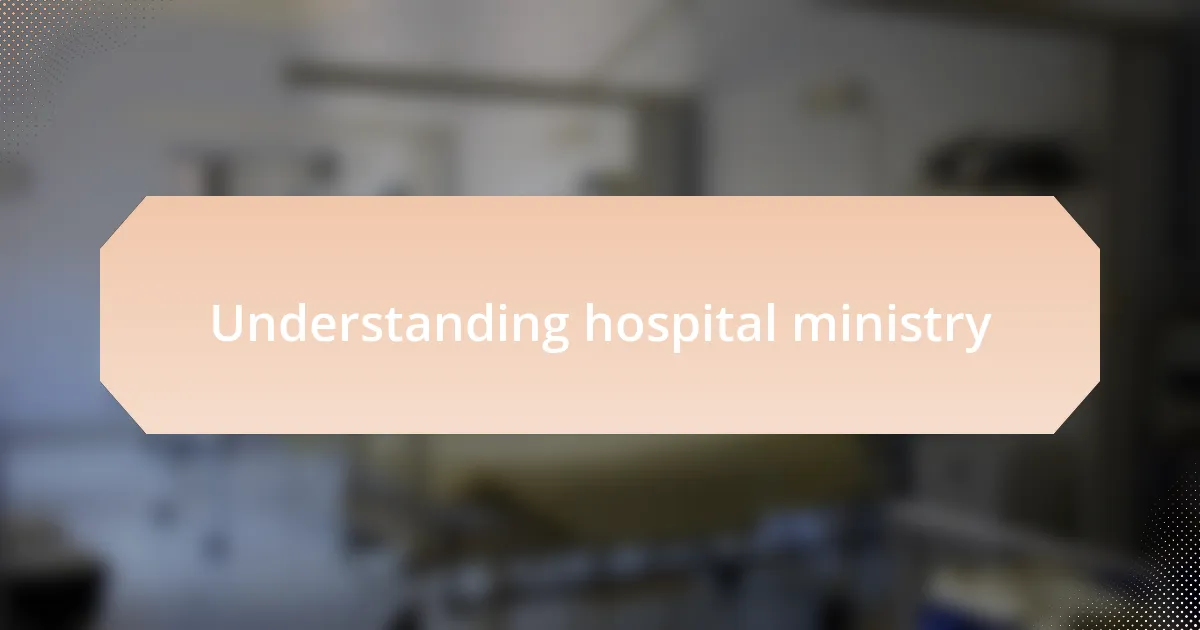
Understanding hospital ministry
Hospital ministry plays a vital role in providing spiritual support to patients and their families, often during some of the most challenging times in their lives. Reflecting on my experiences, I remember a particular day when I walked into a hospital room to find a family grappling with fear and uncertainty. It was then I realized how crucial my presence could be—simply sitting with them, listening, and offering a prayer transformed the atmosphere from despair to hope.
The essence of hospital ministry lies in its ability to bridge the gap between physical suffering and spiritual healing. Have you ever considered how a simple act of kindness, like offering a comforting word or sharing a story of resilience, can uplift someone’s spirit? I have seen firsthand how these moments foster connections that remind individuals that they are not alone in their trials; we are, in fact, stronger together.
As hospital chaplains and volunteers, we often become conduits of compassion, allowing us to witness profound transformations. I’ll never forget visiting a man who had just received difficult news; he was utterly defeated. Yet, after a heartfelt conversation and a few shared tears, I watched him rediscover a flicker of strength. These experiences reinforce my belief that our presence in hospitals is not just about spiritual care; it’s also a testament to the power of community in times of need.

Importance of community support
Community support can make a world of difference for individuals facing health challenges. I recall a time when a fellow volunteer at my local hospital brought together a group of friends of a patient. Their collective energy filled the room with warmth and laughter, turning a place of worry into a semblance of home. It struck me how just being surrounded by caring, familiar faces offered the patient a sense of strength, underscoring the importance of having a supportive network during tough times.
When we lean on our communities, we tap into a reservoir of strength that can propel us forward in ways we might not expect. I remember once discussing with a family member of a patient about their sense of isolation; they felt lost and overwhelmed. Yet, when they began to connect with a support group facilitated through the hospital ministry, I could see a palpable shift. Their newfound connections brought not only shared experiences but also a sense of belonging and hope.
Sometimes, it’s difficult to navigate the emotional toll that comes with health crises alone. Reflecting on my journey, I’ve seen that community support often fills in those gaps. I recall visiting a woman who initially felt abandoned, yet her spirits soared when a few of her friends started to visit regularly. It was in those moments of laughter and reminiscing that I understood: community support is crucial not only for emotional healing but also for fostering resilience that helps us cope with the challenges we face.
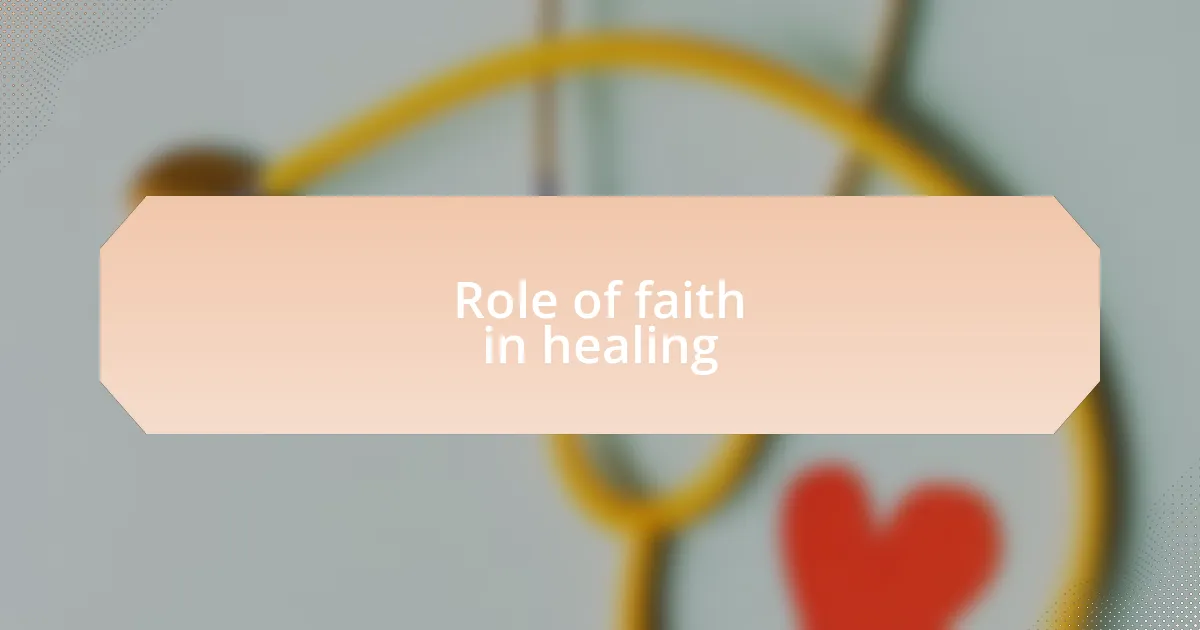
Role of faith in healing
Faith often acts as a healing balm, especially in moments of profound struggle. I recall a time when I visited a patient who was battling cancer. Despite the gravity of her situation, she expressed a sense of peace that seemed rooted in her unwavering faith. It struck me then that her belief in something greater provided her not only comfort but also strength to face each day. How can such a powerful source of hope not play a pivotal role in the healing journey?
In my experience, faith can transform fear into courage. I remember a conversation with a nurse who shared a story about a patient whose physical health was declining, but whose spirit remained resilient because of her faith. Every time this patient faced a new challenge, she turned to prayer, drawing support from her religious community. Her optimism was contagious; it seemed to inspire everyone around her. This raises the question: could it be the power of faith that fosters a profound impact on not just emotional well-being but also physical recovery?
When individuals experience health struggles, faith can guide them through the uncertainty. I’ve seen countless moments where organizations come together, offering not just prayers but also tangible support, such as meals and companionship. One time, during a group prayer meeting at the hospital, a patient shared her gratitude for the divine strength that helped her confront her diagnosis. It reminded me how faith can act as a unifying force, allowing people to lean on something bigger than themselves. The sense of connection created through shared beliefs can be incredibly uplifting during challenging times.
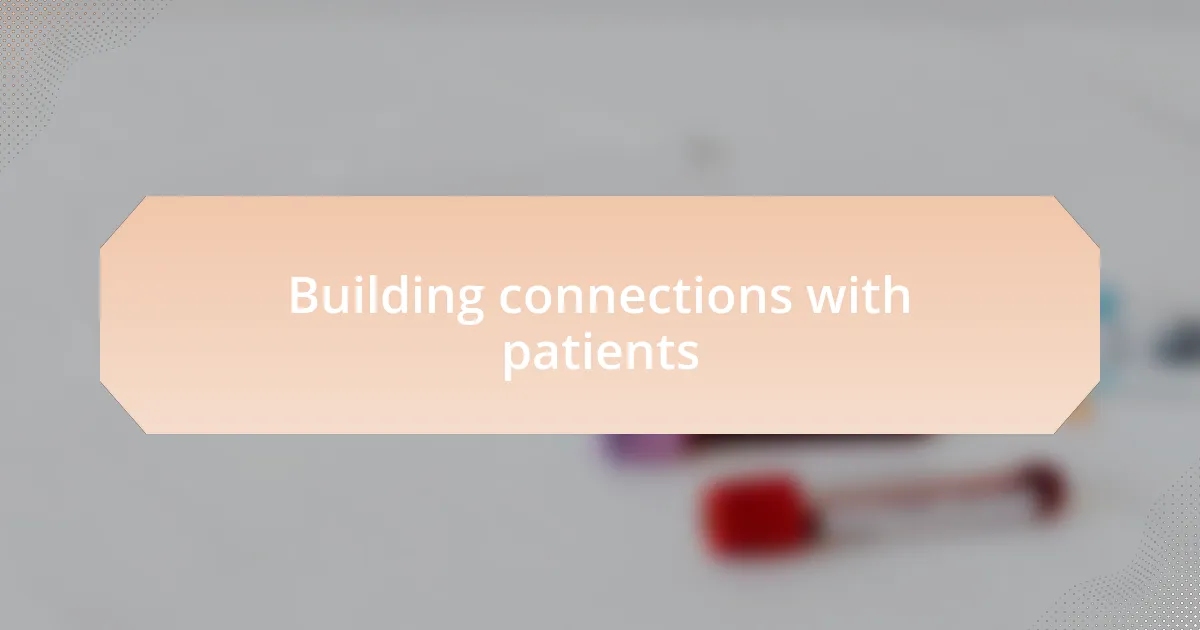
Building connections with patients
Building connections with patients involves more than just a few friendly words. I remember sitting with a young patient who shared her fears about the treatment ahead. By simply listening and validating her feelings, we created a bond that allowed her to open up about her hopes and dreams. It made me realize that a listening ear can sometimes provide more comfort than any medication.
During my time in hospital ministry, I learned the importance of shared experiences. I once organized a small gathering for patients undergoing similar treatments. As they exchanged stories, I watched barriers dissolve, replaced by laughter and mutual support. Isn’t it amazing how, in the depths of vulnerability, we can find strength in one another?
Connection also often happens in the smallest of gestures. I once handed a patient a handwritten note, simply encouraging her to take things one day at a time. The way her eyes lit up was a reminder that sometimes, the simplest act of kindness can uplift spirits. Have you ever experienced a moment when a small gesture made a significant impact on your day? These moments reinforce that connection flourishes in compassion and understanding.
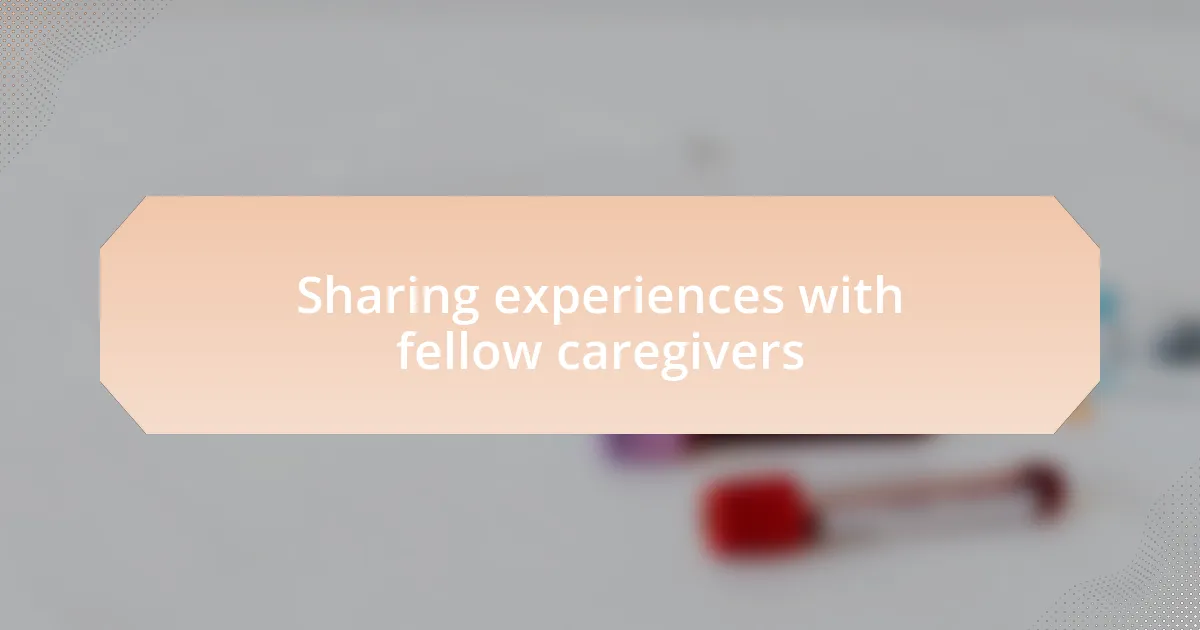
Sharing experiences with fellow caregivers
I often find that sharing experiences with fellow caregivers can be incredibly revitalizing. One evening, while volunteering late, I sat down with a colleague who was opening up about her struggles with burnout. Listening to her candidly express her feelings not only fortified our bond but also reminded me that I’m not alone in facing these challenges. Hasn’t there been a moment when you felt the weight lift simply by sharing your thoughts with someone who understands?
I recall a particularly tough week when a fellow caregiver and I met for coffee. As we traded stories about our most challenging moments and victories, I realized how much we learned from each other’s experiences. We didn’t just unload our burdens; we also celebrated the small wins that might have gone unnoticed in solitude. Isn’t it refreshing to find that kind of camaraderie, where shared struggles transform into collective resilience?
It’s incredible how empathetic connections can flourish in these moments of sharing. During a small support group I facilitated, I encouraged caregivers to recount their most poignant encounters with patients. By the end of our session, I could feel the room radiating with newfound hope and strength. Have you ever left a conversation feeling inspired by the stories and insights of others? Enriching our experiences through each other’s narratives truly nourishes our spirit as caregivers.
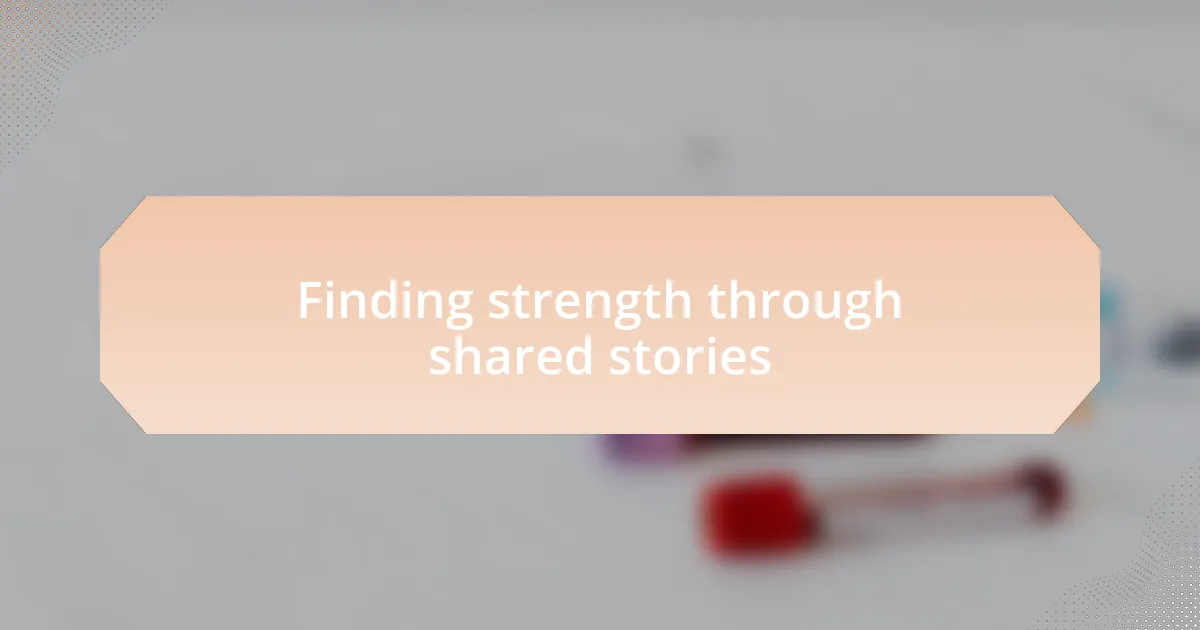
Finding strength through shared stories
When we open ourselves to share our stories, we often find a well of strength we didn’t know existed. I remember a moment during a group therapy session when one caregiver shared her fears about losing a patient she had grown close to. As she recounted her experience, the room grew quiet, and you could feel the shared empathy weaving us together. In that vulnerable space, I found courage to share my own fears, realizing we all carry similar burdens that bind us closer.
Another poignant experience happened during a hospital ministry retreat. As we gathered to share our journeys, I was struck by the diverse paths everyone had taken. One participant expressed how a simple act of kindness from a patient had transformed her outlook on caregiving. Listening to her story opened my eyes to the profound impact our interactions can have, igniting a sense of purpose within us all. Have you ever felt a shift in your perspective just by hearing how someone else navigated their struggles?
These shared stories not only create understanding but also foster resilience. In one instance, a caregiver opened up about an overwhelming loss, and instead of shying away from discomfort, several of us shared our own experiences of grief. It was in that collective sharing that I found not just comfort, but also healing. Isn’t it amazing how our narratives have the power to uplift each other, turning sorrow into strength?
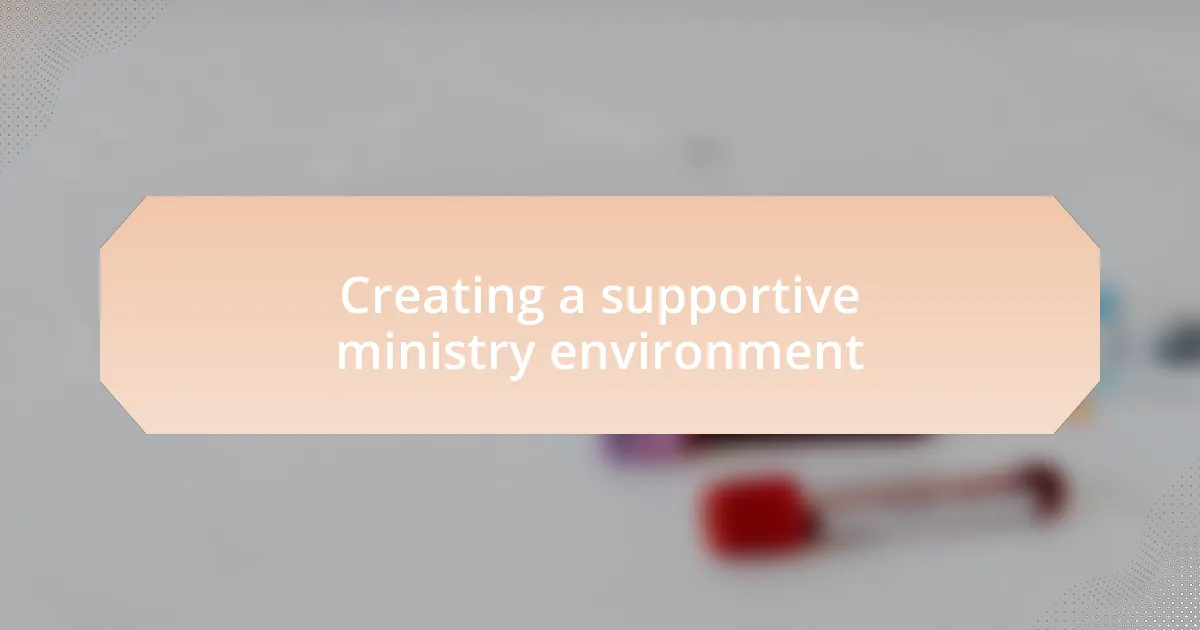
Creating a supportive ministry environment
Creating a supportive ministry environment hinges on cultivating an atmosphere of acceptance. I recall a team meeting where we intentionally set aside time to acknowledge one another’s contributions, reinforcing the notion that every voice matters. This simple act transformed our interactions, leading to more open discussions and a stronger sense of unity. How often do we stop to recognize the impact of appreciation in our ministry efforts?
Building connections is another vital aspect. During a particularly challenging week, we organized informal gatherings where caregivers shared their highs and lows over coffee. These moments created a safe space where I could vent about my frustrations and hear that others felt the same way. It struck me how these small gatherings allowed us to lean on each other, highlighting that our collective strength often flourishes in shared vulnerability.
Moreover, establishing clear communication channels plays a crucial role in unity. In my experience, when we adopted regular check-ins, the level of transparency in our ministry improved significantly. I often found myself reaching out for help or advice, and in return, others felt empowered to do the same. I wonder, what would it look like if every ministry prioritized honest communication, paving the way for an even more supportive environment?